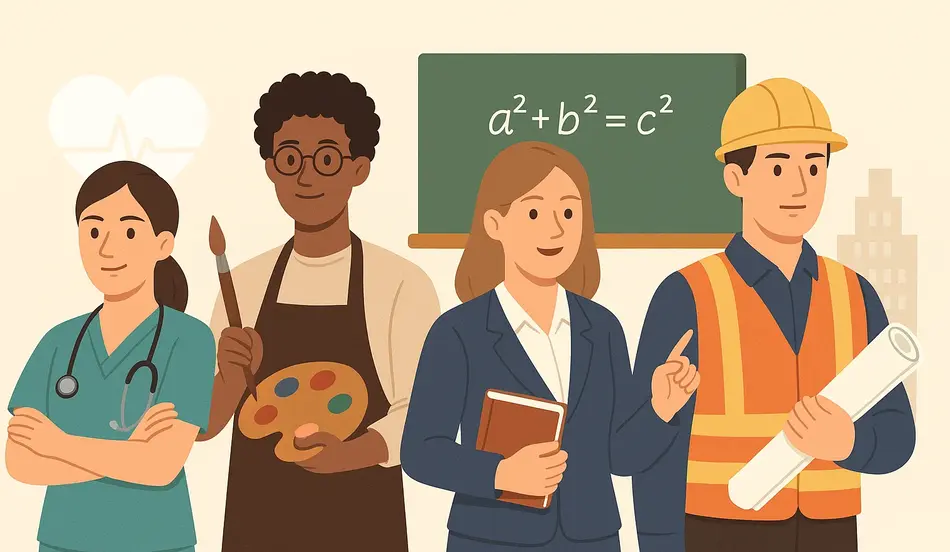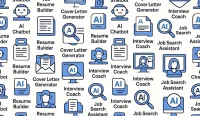Introduction: The AI Takeover Myth — And the Human Edge
Artificial intelligence is changing the way we work. From automating emails to analyzing complex data sets, AI has become a permanent fixture in modern workflows. Yet amid headlines about job loss and automation, a quieter reality is emerging: not all jobs can be replaced by AI — at least not yet.
In fact, many roles are thriving because of human qualities that machines can’t replicate — like empathy, creativity, critical thinking, and moral judgment. As we look to the future of work, it’s essential for professionals to understand where AI falls short and how to position themselves in resilient, future-proof careers.
Why AI Can’t Replace Every Job
Despite impressive advancements in natural language processing, computer vision, and machine learning, AI still has major limitations in areas like:
- Emotional intelligence
- Physical dexterity
- Cultural context
- Ethical decision-making
- Creative originality
Most AI systems are designed to optimize repetitive tasks based on data patterns. But the human brain still holds a monopoly on nuanced thinking, intuition, compassion, and moral reasoning.
Top 7 Future-Proof Jobs AI Can’t Replace (Yet)
1. 🧠 Mental Health Professionals
Why AI can’t replace it: Empathy, emotional nuance, and trust-building
Therapists, psychologists, and counselors rely on a deep understanding of human emotions, trauma, and interpersonal dynamics. While AI can offer mood tracking or chatbot support, it lacks the emotional sensitivity and human trust that therapeutic relationships require.
Future-proof factor: Rising mental health awareness and post-pandemic stress have fueled global demand.
2. 🎓 Educators & Learning Designers
Why AI can’t replace it: Personalization, mentorship, and classroom management
AI can grade assignments or generate quizzes, but it can’t adapt its teaching style to suit a student’s personality, background, or emotional state. Teachers do more than transfer knowledge—they inspire, mediate, and foster curiosity.
Future-proof factor: Lifelong learning and reskilling demand real human guidance and feedback.
3. 🎨 Creative Professionals (Writers, Designers, Filmmakers)
Why AI can’t replace it: Original storytelling, emotion-driven content, brand voice
While AI tools like ChatGPT or Midjourney can generate copy or images, they mimic patterns—they don’t create truly original ideas rooted in lived experience. Human creativity still dominates in fields where tone, irony, subtext, and identity matter.
Future-proof factor: Brands need authentic storytelling and emotional resonance to cut through digital noise.
4. 👩⚕️ Healthcare Workers (Nurses, Surgeons, Physical Therapists)
Why AI can’t replace it: Patient trust, physical examination, real-time decisions
Even with robotic-assisted surgery and diagnostic algorithms, human healthcare workers remain irreplaceable. Nurses build patient relationships. Surgeons must make split-second ethical decisions. Physical therapists read body language and guide healing.
Future-proof factor: Aging populations and chronic illness ensure healthcare growth for decades.
5. ⚖️ Legal Experts & Ethical Consultants
Why AI can’t replace it: Moral reasoning, ethics, and societal context
Lawyers, compliance officers, and ethics consultants deal with more than rules—they interpret law through cultural, political, and human lenses. AI may assist with research, but it can’t fully evaluate legal nuance or societal consequences.
Future-proof factor: As AI itself raises legal/ethical challenges, demand for human oversight will grow.
6. 👨🔧 Skilled Trades (Electricians, Plumbers, Mechanics)
Why AI can’t replace it: Physical dexterity, problem-solving in chaotic environments
While factories are automating repetitive tasks, tradespeople work in unpredictable real-world settings — like rewiring an old house or fixing a complex engine. AI and robotics struggle with hands-on repair, spatial challenges, and on-the-fly troubleshooting.
Future-proof factor: Infrastructure upgrades and sustainability efforts rely on human trade skills.
7. 🧭 Leaders & Strategic Thinkers
Why AI can’t replace it: Vision, values, and human inspiration
Whether it’s a CEO, political leader, or community organizer, real leadership is not data-driven — it’s people-driven. Leaders make decisions in ambiguity, manage conflicting interests, and inspire others with a sense of purpose.
Future-proof factor: Every organization needs human leadership to shape strategy, mission, and culture.
Want a Career That AI Can’t Replace?
Explore thousands of job listings in healthcare, education, skilled trades, and creative industries on WhatJobs — where human-first talent still leads the way.
🔍 Search Human-Centered JobsBonus Category: The Rise of Hybrid Human+AI Roles
While AI may not replace many jobs outright, it is reshaping them. New hybrid roles are emerging — where humans and machines collaborate to deliver better outcomes.
Examples include:
- AI-assisted marketing strategists
- Data-curious journalists
- Human trainers for AI models
- AI ethicists and policy advisors
- Content editors refining AI drafts
These roles reward workers who embrace AI as a partner, not a threat — and continuously evolve their skill sets.
Skills You Should Double Down On
To thrive in jobs AI can’t replace, focus on building skills that are deeply human:
| Core Skill | Why It Matters |
|---|---|
| Emotional Intelligence | Navigate relationships and read unspoken cues |
| Critical Thinking | Solve ambiguous problems with judgment |
| Creative Expression | Deliver original ideas, not predictable patterns |
| Ethical Reasoning | Apply values and societal impact to decisions |
| Adaptability | Learn and grow as tools and environments evolve |
| Collaboration | Work across disciplines, cultures, and technologies |
Final Thoughts: Future-Proofing Isn’t About Fear — It’s About Focus
The future of work isn’t about competing with AI — it’s about complementing it. The jobs that survive and thrive are those that rely on deeply human strengths that machines can’t replicate.
If you’re looking to future-proof your career, start by identifying where your humanity is your advantage. Then find ways to blend your skills with technology—not resist it.




